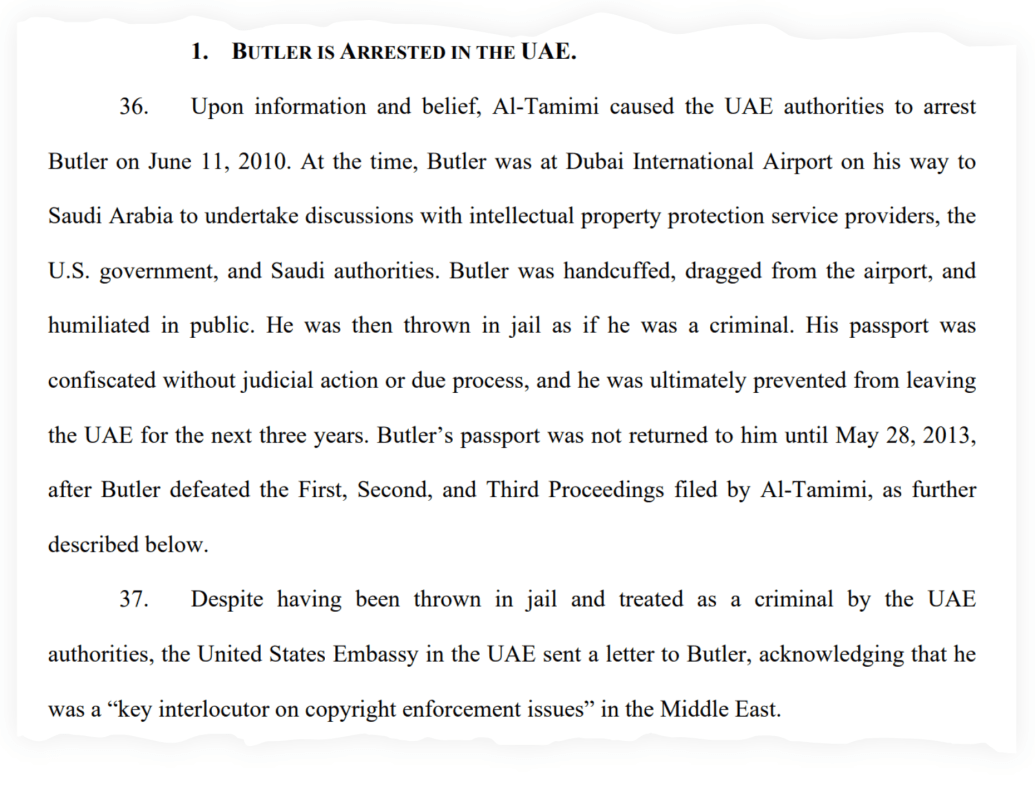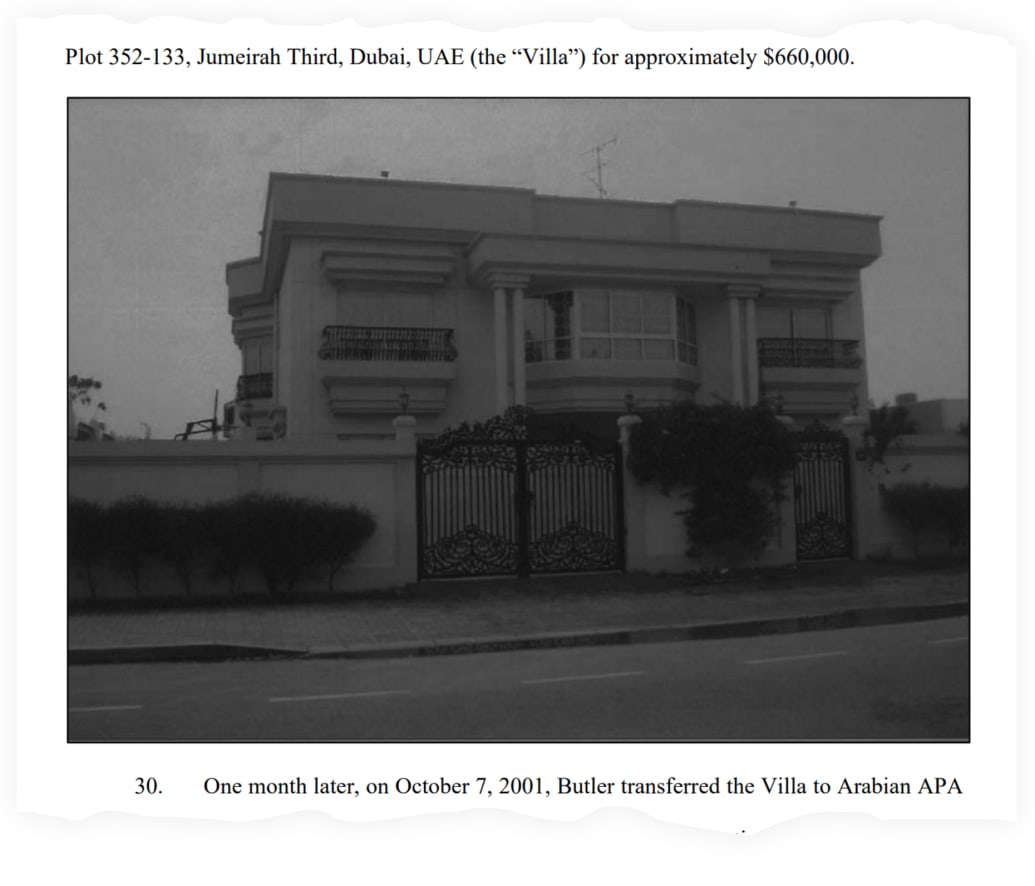When a garden-variety business dispute turned ugly, an ex-U.S. Army Special Forces operator running an anti-counterfeiting consultancy in Dubai says he was “handcuffed, dragged from the airport, and humiliated in public,” before being jailed on false charges.
Then, things apparently got really bad.
Combat veteran Scott F. Butler is now seeking tens of millions of dollars in damages from his former partner Essam Al-Tamimi, for what Butler claims has been a continuing effort to destroy his life, according to a newly filed lawsuit obtained by The Daily Beast.
In the filing, Butler claims his one-time colleague, a Harvard-trained attorney with links to Arab royalty, carried out a “total war” against him, allegedly getting the 58-year-old father-of-two barred from leaving the country while stealing a $3.1 million villa out from under his nose.
Al-Tamimi, 61, is the founder of the Middle East’s largest law firm, which counts numerous members of the region’s ruling families as clients, according to Butler’s lawsuit. Butler claims Al-Tamimi used his connections and influence to “weaponiz[e] the legal system in the United Arab Emirates,” filing spurious criminal and civil charges against him to this day. Nevertheless, every case Al-Tamimi has brought against Butler has ultimately been thrown out, save a few in which the “political favoritism towards Al-Tamimi” was simply insurmountable, the lawsuit states.
The years-long saga might serve as a cautionary tale for anyone working in—or traveling through—a potentially hostile environment. Recently, pro basketball player Brittney Griner spent nine months in a Russian prison after airport police in Moscow claimed to have found less than a gram of cannabis oil in her luggage. In Cuba, foreign business people have been arrested and jailed on trumped-up charges laid by government officials keen on appropriating their investments. In October, six American Citgo executives were finally freed from a Venezuelan prison after being imprisoned for several years on dubious embezzlement accusations.
Dubai, for its part, has managed to cultivate a more benign, business-friendly image. Yet, there is a “stark difference between the progressive and forward-thinking image the UAE projects on the international stage,” and what really goes on in the Emirates, according to the nonprofit Gulf Centre for Human Rights. In Dubai, where defaulting on a debt can land you in prison, a debtor’s relative can be arrested for money they themselves don’t even owe.
Butler is presently at his U.S. home “on the West Coast,” and will not be available for comment until next week, a spokesman for his attorney told The Daily Beast. Al-Tamimi, who does not have a lawyer listed in court filings, did not respond to multiple requests for comment on Saturday.
Over the course of Butler’s decade as a Green Beret, he deployed to Panama, Somalia, and Kuwait, leading highly specialized High Altitude Low Opening (HALO) parachute units. After retiring as a major in 1996, Butler began investigating IP theft for major Hollywood film studios.
He set up shop in Dubai, seeking out copyright pirates around the region on behalf of instantly recognizable names such as Walt Disney Studios, Paramount Pictures, and Warner Brothers Entertainment. Along the way, Butler met Al-Tamimi, who aside from his law practice, also runs one of Dubai’s top investment firms. He owns homes in the U.S. that are worth many millions, including a spread near Sun Valley in Idaho and a $7.5 million condo in Boston, according to public records.
Butler eventually decided to hang out his own shingle, and in July 2000, he and Al-Tamimi co-founded the Arabian Anti-Piracy Alliance (Arabian APA). The firm specialized in “investigating counterfeit products and shutting down factories pumping out counterfeit goods in countries like Kuwait, Qatar, the Kingdom of Bahrain, Oman, the Kingdom of Saudi Arabia, and the UAE,” Butler’s lawsuit says, noting that Arabian APA serviced clients such as Cartier, Nike, Apple, Microsoft, Procter & Gamble, and Sony.
Butler, Arabian APA’s general manager and CEO, owned 65 percent of the company, while Al-Tamimi owned the remaining 35 percent. Arabian APA’s work led to numerous arrests, including helping the Saudis capture an accused DVD pirate in a crackdown by the kingdom’s information ministry. The company eventually employed more than 50 people, and generated millions of dollars in revenue, according to Butler’s suit.
In September 2001, Butler paid $660,000 for a 10,000 square-foot villa near Dubai’s ultra-luxe Burj Al Arab hotel, the suit says.
“One month later, on October 7, 2001, Butler transferred the Villa to Arabian APA to use as collateral for loans so that the company could expand its operations,” it explains. “With Al-Tamimi’s agreement, Arabian APA’s board passed a resolution declaring the Villa an asset of the company.”
The disputed villa.
New York State Supreme Court
In 2004, Butler used the villa as collateral to get Arabian APA a $520,000 business loan, of which he and the company paid off 98 percent over the next several years. Butler says he trusted Al-Tamimi, and relied on him for advice.
“But, unknown to Butler at the time, Al-Tamimi had designs on the Villa once it became Arabian APA’s asset,” the lawsuit states. “Years later, Al-Tamimi would file several court cases in an effort to separate Butler from Arabian APA and the Villa it then owned.”
For all of Arabian APA’s success, the relationship between Butler and Al-Tamimi had been gradually disintegrating. Al-Tamimi, who claims to be an expert in dispute resolution, “did not (and consistently refused to) invest money, effort, or time in Arabian APA,” Butler’s suit alleges.
“From the start, Al-Tamimi acted as if Arabian APA was his own business and took advantage of Butler’s status as a foreigner,” it states, adding that although Al-Tamimi never injected his promised $100,000 into the company, he still registered himself as an equal partner in official filings. Al-Tamimi also made important decisions without first consulting Butler, refusing to share crucial information and documents, Butler’s suit alleges.
The filing accuses Al-Tamimi of similar behavior with others, claiming he is “known to conceal his personal investments under special-purpose vehicles and offshore companies.” When Al-Tamimi’s wife divorced him in 2017 after discovering he had an affair while she was pregnant, he tried to take back roughly $15 million in London real estate he had gifted her for “being a faithful wife,” according to reports at the time.
Frustrated and stuck, Butler says he offered in October 2009 to buy Al-Tamimi out.
He offered up a plan to sell the villa, which was by then worth about $2.2 million—more than the value of the company—and pay Al-Timimi for his share of the company from the proceeds, according to the lawsuit. The bank did not object, but Al-Tamimi “demanded to keep the Villa for himself as a condition for terminating the shareholders’ agreement,” the suit continues. When Butler said no, Al-Tamimi decided to “remove [him] from the Middle East by any means necessary.”
For Al-Tamimi, Butler’s lawsuit says, “Total War was the only solution.”
“Al-Tamimi used and abused the whole gambit of legal processes available to him,” it alleges, contending that Al-Tamimi, “through his connections in the UAE,” bent the system to his own advantage—and Butler’s grave detriment.
“Al-Tamimi started by working through his political connections in the UAE to facilitate the imprisonment of Butler in Dubai and the confiscation of his passport for six years, keeping Butler half-a-world away from his wife and children,” the suit attests. “But that was not enough for Al-Tamimi. He sought to remove Butler’s presence from the Middle East entirely.”
Al-Tamimi filed criminal charges against Butler, and tried to force him into bankruptcy, according to the lawsuit, which further accuses Al-Tamimi of interfering with Butler’s clients, “demanding they cease their business relationship” with him.
“And eventually,” it says, “he stole the Villa in Dubai.”
Butler says his nightmare began in earnest on June 11, 2010, when he was arrested at Dubai International Airport as he was preparing to fly to Saudi Arabia for IP protection policy discussions with service providers, the U.S. government, and Saudi authorities.
His hands were shackled and he was “dragged from the airport,” after which he was “thrown in jail as if he was a criminal,” Butler‘s lawsuit states, explaining that Al-Tamimi had gone full scorched-earth, filing a criminal complaint accusing Butler of having embezzled $75,000 in company funds from Arabian APA.
Eight months later, the UAE Public Prosecution Department dropped the case after concluding there were “no grounds for Al-Tamimi’s claims,” Butler’s suit states.

New York State Supreme Court
In July 2011, Butler was again hauled into court on the same criminal embezzlement charge, “at Al-Tamimi’s behest,” his lawsuit alleges. Again, the charges were dismissed. Al-Tamimi’s appeal was dismissed, and his appeal of the dismissal was also thrown out, according to Butler.
But Al-Tamimi kept coming. In December 2012, unbeknownst to Butler, Al-Tamimi filed a civil action to liquidate Arabian APA. The process would include selling the villa “with the intent to take all of the proceeds from the sale,” Butler’s suit claims. Butler was never served with any papers over the liquidation, though he eventually got wind of the scheme from “a third party,” and the liquidation proceeding was dismissed, it says.
Over the next eight years, Al-Tamimi filed action after action in courts in the UAE and Bahrain, trying to wrest control of Arabian APA and the villa from Butler. Most of the cases were dismissed, save a “small handful, where political favoritism towards Al-Tamimi could not be overcome,” according to the lawsuit. In one, Butler was forced to pay Al-Tamimi $100,000 in legal fees, which marked “a turning point” for him, the suit says.
It was now impossible for Butler to continue his work under the Arabian APA banner, but, according to the lawsuit, he “maintained his passion for preventing the infringement of intellectual property rights in the Middle East.” He then “worked to disassociate himself from Al-Tamimi and formed Arabian Company and American APA in 2016,” operating throughout the Middle East. In September of that year, Butler says he was arrested once again by UAE authorities, his passport confiscated, and barred from leaving for three months.
Still, Butler soldiered on, according to his lawsuit.
Soon after he established his new, independent, business, Arabian APA’s “long-standing customers, like Hewlett Packard, Procter & Gamble, and Apple, chose to continue their trustworthy and successful relationship with Butler,” the suit claims. “They moved their business to Arabian Company and American APA, and away from Al-Tamimi.”
This further enraged Al-Tamimi, Butler maintains, alleging that Al-Tamimi continues to try to ruin him. A few days before Christmas 2018, Al-Tamimi secretly used the disputed villa, which was by then worth “at least $3.1 million,” as collateral for a $9 million personal loan, according to Butler’s lawsuit. He has maintained his legal campaign in the courts in an alleged attempt to drive Butler out of business, and has put pressure on current and prospective clients not to work with him.
In 2020, Butler claims, Al-Tamimi finally got the ultimate prize.
Shortly after Butler obtained a court order forbidding Al-Tamimi from selling the disputed villa, Arabian APA’s bank claimed ownership of the property without Butler’s knowledge and “worked with Al-Tamimi” to sell it to an unnamed buyer for $1.3 million, the lawsuit maintains. Al-Tamimi kept $1.1 million of the proceeds, and the bank kept the rest, the suit states, alleging the bank and Al-Tamimi “schemed together to disburse the sale proceeds between themselves and to deny Butler anything.”
Al-Tamimi subsequently transferred the funds to a personal bank account in the U.S., reinvesting the money in stateside real estate, according to Butler, who claims he was stiffed by both Al-Tamimi and the bank.
Butler is suing Al-Tamimi in New York City, where the Emirati allegedly routed the proceeds of the villa sale, claiming malicious prosecution, abuse of process, and fraud. He is asking for a jury trial, and damages of no less than $67 million.



